现在完成时及现在完成进行时讲解及练习(1)
现在完成时及现在完成进行时讲解及练习
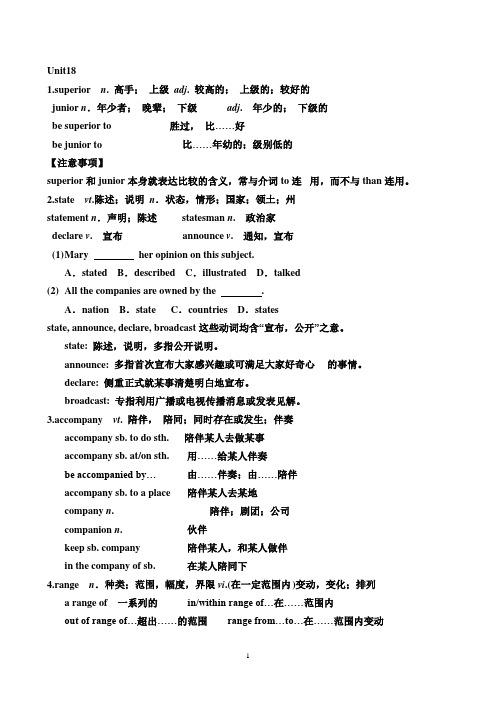
Unit181.superior n. 高手;上级adj. 较高的;上级的;较好的junior n.年少者;晚辈;下级adj. 年少的;下级的be superior to 胜过,比……好be junior to 比……年幼的;级别低的【注意事项】superior和junior本身就表达比较的含义,常与介词to连用,而不与than连用。
2.state vt.陈述;说明n.状态,情形;国家;领土;州statement n.声明;陈述statesman n. 政治家declare v. 宣布announce v. 通知,宣布(1) M ary her opinion on this subject.A.stated B.described C.illustrated D.talked(2) All the companies are owned by the .A.nation B.state C.countries D.statesstate, announce, declare, broadcast这些动词均含“宣布,公开”之意。
state: 陈述,说明,多指公开说明。
announce: 多指首次宣布大家感兴趣或可满足大家好奇心的事情。
declare: 侧重正式就某事清楚明白地宣布。
broadcast: 专指利用广播或电视传播消息或发表见解。
3.accompany vt. 陪伴,陪同;同时存在或发生;伴奏accompany sb. to do sth. 陪伴某人去做某事accompany sb. at/on sth. 用……给某人伴奏be accompanied by… 由……伴奏;由……陪伴accompany sb. to a place 陪伴某人去某地company n. 陪伴;剧团;公司companion n. 伙伴keep sb. company 陪伴某人,和某人做伴in the company of sb. 在某人陪同下4.range n.种类;范围,幅度,界限vi.(在一定范围内)变动,变化;排列a range of一系列的in/within range of…在……范围内out of range of…超出……的范围range from…to…在……范围内变动(1) These are our new __________(种类)of beauty products.(2) The shirts are sold out _____________________(在这个价位范围之内).(3) The age of the students in our school ___________(在……范围内变动)14 to 18.5.bound n.一跳,一跃adj.注定的be bound for准备去;前往be bound to do sth. 必定做某事;有责任做某事(1) You have done so much that you _________________(必定会成功).(2) We ______________________(打算回家过……)the Spring Festival.(3) I feel ___________(有必要)tell you about it.are bound to succeed are bound for home for bound to6.unlike prep.不同,不像like像……feel like 想要;意欲……look like 看起来像……;看来似乎……something like 几分像……It's like/unlike sb. to do sth.做某事,实在像/不像某人。
现在完成时讲解(含讲解及习题)
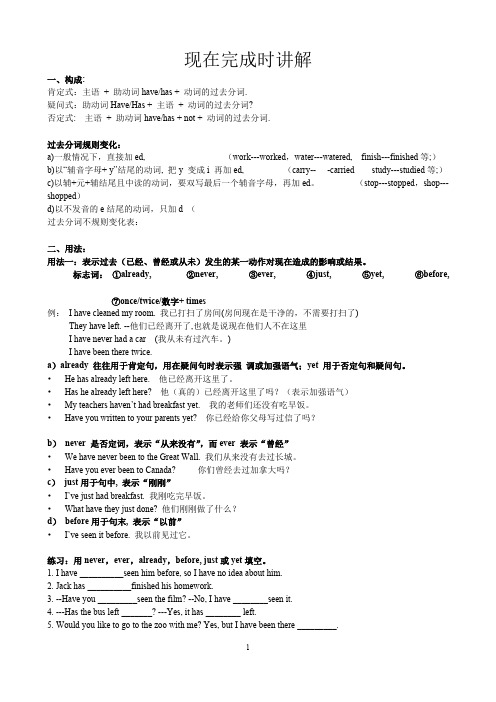
现在完成时讲解一、构成:肯定式:主语+ 助动词have/has + 动词的过去分词.疑问式:助动词Have/Has + 主语+ 动词的过去分词?否定式: 主语+ 助动词have/has + not + 动词的过去分词.过去分词规则变化:a)一般情况下,直接加ed, (work---worked,water---watered, finish---finished等;)b)以“辅音字母+ y”结尾的动词, 把y 变成i 再加ed, (carry---carried study---studied等;)c)以辅+元+辅结尾且中读的动词,要双写最后一个辅音字母,再加ed。
(stop---stopped,shop---shopped)d)以不发音的e结尾的动词,只加d (过去分词不规则变化表:二、用法:用法一:表示过去(已经、曾经或从未)发生的某一动作对现在造成的影响或结果。
标志词:①already, ②never, ③ever, ④just, ⑤yet, ⑥before,⑦once/twice/数字+ times例:I have cleaned my room. 我已打扫了房间(房间现在是干净的,不需要打扫了)They have left. --他们已经离开了,也就是说现在他们人不在这里I have never had a car (我从未有过汽车。
)I have been there twice.a)already 往往用于肯定句,用在疑问句时表示强调或加强语气;yet 用于否定句和疑问句。
•He has already left here. 他已经离开这里了。
•Has he already left here? 他(真的)已经离开这里了吗?(表示加强语气)•My teachers haven’t had breakfast yet. 我的老师们还没有吃早饭。
•Have you written to your parents yet? 你已经给你父母写过信了吗?b)never 是否定词,表示“从来没有”,而ever 表示“曾经”•We have never been to the Great Wall. 我们从来没有去过长城。
现在完成时态讲解和练习

现在完成时态讲解及练习一、现在完成时的构成肯定句:主语+have/ has + done (过去分词)+其它He has lived in Shenzhen for 4 years.一般疑问句:Have/ Has +主语+ done (过去分词)+其它Has he lived in Shenzhen for 4 years?否认句: 主语+have/ has+ not + done (过去分词)+其它He has not finished his homework.过去分词的构成方法如下 :1.一般情况下,直接在动词原形后面加 –ed.work---worked answer---answered obey---obeyed want---wanted 2.以不发音的 -e 结尾的动词只加 –d.Move---moved hope---hoped divide---divided 3.字尾是辅音+y 的动词。
那么将y 改i 加ed. study---studied tidy---tidied satisfy---satisfied4.以重读闭音节结尾的词,这些词的末尾只有一个辅音字母时,双写这个辅音字母,再加 –ed. stop---stopped regret--- regretted drop---dropped不规那么动词过去式与过去分词分类记忆表一、AAA. 〔原形,过去式和过去分词一致〕二、ABB 〔过去式和过去分词一致〕3) 过去式、过去分词-t 替换原形-d6) 过去式、过去分词改为-elt二、现在完成时标志词:recently; recent years; these days/ years; lately; since; for+时间段;in the past few years; ever since; in the last five months; up to now; since then; so far; ever; never, yet; once; twice; already; before; just already (已经): 用于肯定句I have already posted the letter .yet(已经): 用于否认句,疑问句He hasn’t done his homework yet.just(刚刚)They have just left.ever(曾经)Have you ever been to Beijing ?never(从不)I have never seen him .before(以前)Have you seen the film before?since(自从…以来)I’ve worked in the school si nce 1999.for(长达)He’s lived in Shenzhen for 6 years.in the past several days / weeks/ years(在过去的…)recently(最近)I have not written to my parents recently.so far(到目前为止)So far she has learned 5 English songs.up to now(到目前为止)this morning/month/year(今天早上/这个月/今年)三、现在完成时的用法1)现在完成时表示过去发生的动作,并对现在有影响。
现在完成时与现在完成进行时态讲解及练习(含答案)
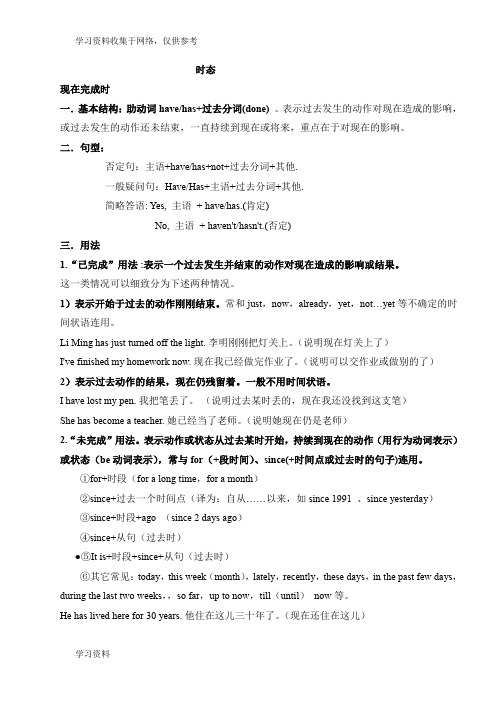
时态现在完成时一.基本结构:助动词have/has+过去分词(done) 。
表示过去发生的动作对现在造成的影响,或过去发生的动作还未结束,一直持续到现在或将来,重点在于对现在的影响。
二.句型:否定句:主语+have/has+not+过去分词+其他.一般疑问句:Have/Has+主语+过去分词+其他.简略答语: Yes, 主语+ have/has.(肯定)No, 主语+ haven't/hasn't.(否定)三.用法1.“已完成”用法 :表示一个过去发生并结束的动作对现在造成的影响或结果。
这一类情况可以细致分为下述两种情况。
1)表示开始于过去的动作刚刚结束。
常和just,now,already,yet,not…yet等不确定的时间状语连用。
Li Ming has just turned off the light. 李明刚刚把灯关上。
(说明现在灯关上了)I've finished my homework now. 现在我已经做完作业了。
(说明可以交作业或做别的了)2)表示过去动作的结果,现在仍残留着。
一般不用时间状语。
I have lost my pen. 我把笔丢了。
(说明过去某时丢的,现在我还没找到这支笔)She has become a teacher. 她已经当了老师。
(说明她现在仍是老师)2.“未完成”用法。
表示动作或状态从过去某时开始,持续到现在的动作(用行为动词表示)或状态(be动词表示),常与for(+段时间)、since(+时间点或过去时的句子)连用。
①for+时段(for a long time,for a month)②since+过去一个时间点(译为:自从……以来,如since 1991 、since yesterday)③since+时段+ago (since 2 days ago)④since+从句(过去时)●⑤It is+时段+since+从句(过去时)⑥其它常见:today,this week(month),lately,recently,these days,in the past few days,during the last two weeks,,so far,up to now,till(until)now等。
现在完成时及现在完成进行时讲解及练习(1)

一. 现在完成时的构成:主语+have(has)+过去分词过去分词的构成:规则动词的过去分词的构成:四种情况:(一)1.一般的也是绝大多数的动词是直接在后面加-ed,例如,played2.以e结尾的动词只加-d,例如,loved3.以辅音字母+y结尾的,变y为i再加-ed 例如, worried4.以一个辅音字母(r/w/y除外)结尾的重读闭音节,要双写这个辅音字母再加ed,例如,stopped, planned,(二)不规则动词的变化规则:这些不规则动词有下面一些规律可循,1. AAA型:let, set. hit .cut. put, shut .cost. hurt, read. spread2. AAB型:只有一个,beat---beat---beaten3. ABA型:run. come, become. overcome(克服)4.ABB型:可分为下面六组:第一组:都以t结尾. feel. keep. sleep weep sweep meet leave smell.deal spoil spill第二组:都是变d为t spend lend send build第三组:都是变其中的元音字母lose get win shine dig hang第四组:都以ught结尾, 其中catch, teach以aught结尾bring buy fight think catch teach第五组:都以“d”结尾tell sell lay pay say第六组:无规律组,必须硬记. find stand understand sit have make hold hear mean5.ABC型: 第一组:在过去式上加-n (注:过去式都是以“o+辅音字母+e”结尾的,但rise除外)break-broke-broken choose-chose-chosen forget-forgot-forgottenfreeze-froze-frozen wake-woke-woken speak-spoke-spokensteal-stole-stolen第二组:在原形上加-nsee-saw-seen give-gave-given drive-drove-driventake-took-taken draw-drew-drawn grow-grew-grownknow-knew-known throw-threw-thrown blow-blew-blownshow-showed-shown mistake-mistook-mistaken rise-rose-risen第三组:在原形上加-enwrite-wrote-written(双写t) eat-ate-eaten fall-fell-fallenride-rode-ridden (双写d) hide-hid-hidden(双写d)be-was/were-been第四组:符合i-a-u的原则,并且发音规律相同。
现在完成时及现在完成进行时讲解及练习

现在完成进行时1 定义:现在完成进行时表示动作从过去某一时间开始,一直延续到现在,可能还要继续下去。
2 现在完成进行时的构成:现在完成进行时是由“have/has+been+动词的现在分词”构成3 现在完成进行时的基本句型肯定式I/We have been working.疑问式Have you been working?简略回答Yes,I/we have. No,I/we haven't.肯定式He/She/It has been working.疑问式Has he/she/it been working?简略回答Yes,he/she/it has. No,he/she/it hasn't.4 现在完成时的用法1)在强调指出动作还未结束,还要继续下去。
如:I've been reading this book for two hours,but I haven't finished it. 这本书我已读了两个小时了,但我还没读完。
I've read this book.我已读完这本书了。
2)强调动作延续时间的长久或带感情色彩。
She has always been working like that.她一贯是这样工作的。
3)现在完成进行时也可表示现在以前这段时间反复发生的事情。
We've been seeing quite a lot of each other recently.最近我们经常见面。
5 相同点1. 现在完成时和现在完成进行时都可以表示从过去某一时刻开始一直延续到现在的动作.如: I have worked in this school since 2001. I have been working here since 2001.2. 现在完成时和现在完成进行时都可以表示一段时间内进行的动作.例如: Mr. Smith has taught English for 20 years. Mr. Smith has been teaching English for 20 years 6 现在完成时和现在完成进行时的区别1)现在完成进行时更强调动作的延续性,它是现在完成时的强调形式。
现在完成时和现在完成进行时的用法及区别习题

现在完成时和现在完成进行时的用法及区别习题现在完成时和现在完成进行时谈论的都是过去开始的、现在仍在进行的行动。
这意味着两种时态都可以用 how long 来回答正在进行的动作,然而,它们的关注点略有不同:▪现在完成时:▪1、与延续性和非延续性动词一起使用▪2、关注行动的结果▪3、谈论最近完成的与现在有关的行动或经历▪▪现在完成进行时▪1、仅与延续性动词一起使用▪2、强调动作的持续时间▪3、谈论正在进行的临时行动或新习惯▪一、选择正确的答案完成下面的句子1、_____your new car yet?a、Have you bought b、Have you been buying2、Our teacher _____more than a dozen exam papers up to now.a、has checked b、has been checking3、I _____to many counties so far.a、have travelled b、have been travelling4、I _____my key, I cannot find it.a、have lost have been losing5、It _____non-stop for more than an hour now.a、has rained b、has been raining6、Sara _____for you for a long time; where have you been?a、has been waiting b、has waited7、Brya _____Spanish for three years.a、has been learning b、has learned8、How long _____the piano? "Since I was 5."a、have you been playing b、have you played9、Mariamy _____ lost wallet.a、has found b、has been finding10、We _____you for ages.a、hasn't seen b、hasn't been seeing11、My dad _____in the same company for more than twenty years.a、has been working b、has worked12、My patience _____to anend.a、has come b、has been coming13、How long _____TV, your eyes look so red.a、have you been watching b、have you watched14、I _____for over eight hours now. I am extremely tired.a、have driven b、have been driving15、The jury _____a verdict after three hours.a、has reached b、has been reaching二、答案及解析1、Have you bought解析:yet 是现在完成时的信号词,因此这里选 Have you bought。
初中英语时态讲解及练习-(全)
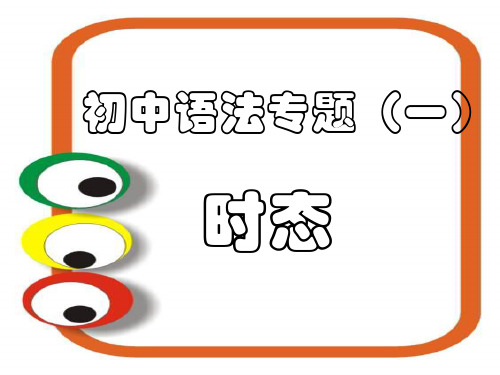
结尾是e的动词在末尾加-d
like→liked live→lived hope→hoped
末尾只有一个辅音字母的重读 plan→planned
闭音节,先双写这个辅音字母,stop→stopped
再加-ed
drop→dropped
结尾是“辅音字母+y”的动词,study→studied
先变“y”为“i”再加-ed
初中语法专题(一)
时态
一般现在时 一般过去时 现在进行时 过去进行时 现在完成时 过去完成时 一般将来时 过去将来时
一般现在时
一、一般现在时:
概念:经常、反复发生的动作或行为及现在的 某种状况。 时间状语: always, usually, often, sometimes, every week (day, year, month…), once a week, on Sundays, etc. 基本结构:①be动词;②行为动词 否定形式:①am/is/are+not;②此时态的谓语动 词若为行为动词,则在其前加don't,如主语为第 三人称单数,则用doesn't,同时还原行为动词。 一般疑问句:①把be动词放于句首;②用助动 词do提问,如主语为第三人称单数,则用does, 同时,还原行为动词。
以辅音字母加y结尾的词 ,先变y为i, 再加-es,读/z/
例子
Play→plays leave→leaves swim→swims
pass →passes fix→fixes teach→teaches wish→wishes do→does
study→studies carry→carries fly→flies
e.g. She will be back in three days. She will not be back in three days. Will She be back in three days? They are going to clean their classroom. They are not going to clean their classroom. Are they going to clean their classroom?
英语八种时态讲解及练习

现在进行时
作谓语的动词用来表示动作(情况) 发生时间的各种形式称为时态。
1.概念:表示现阶段或说话时正在 进行的动作及行为。 2.时间状语:Now, at this time, days, look. listen等时间状语做标志。 3.基本结构:主语+be +doing +其 他 4.否定形式:主语+be +not +doing+ 其他 5.一般疑问句:把be动词放于句首。
现在分词的变法有
1)、一般在动词词尾加上-ing ,E.g. jump 2)、以不发音字母e结尾的动词,先 去e,再加-ing. E.g have write 3)、.以重读闭音节末尾只有一个辅 音字母结尾的词,它前面是单个元 音字母时要先将词尾的辅音字母双 写,再加上-ing. E.g. sit put 其句式 变换都在be上做文章。
10. I will go there when I _____(have, will have, has) time tomorrow. 11. He won’t come to the party unless he _____(be, will be, am, is, are) invited. 12. I’ll wait here until my mother ____(come, comes, will come) back. 13. Please return the book to the library as soon as you ______(finish, finishes, will finish) reading it. 14. Once you _____(see, sees, will see) him, you will never forget him.
现在完成时态讲解及练习
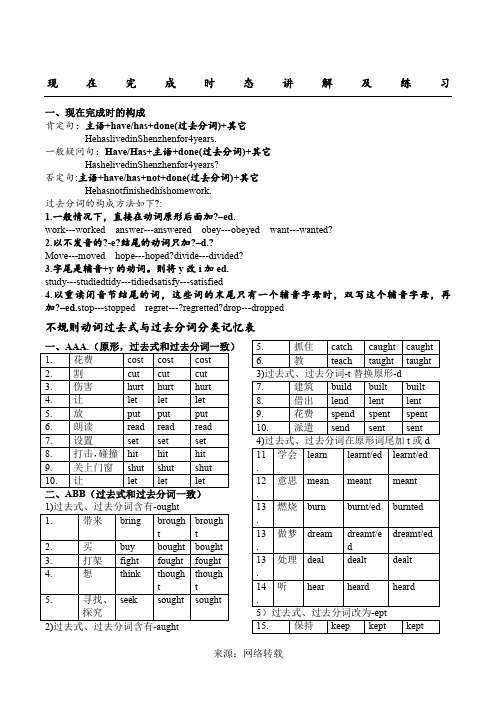
现在完成时态讲解及练习一、现在完成时的构成肯定句:主语+have/has+done(过去分词)+其它HehaslivedinShenzhenfor4years.一般疑问句:Have/Has+主语+done(过去分词)+其它HashelivedinShenzhenfor4years?否定句:主语+have/has+not+done(过去分词)+其它二、现在完成时标志词:recently;recentyears;thesedays/years;lately;since;for+时间段;inthepastfewyears;eversince;inthelastfivemonths;uptonow;sincethen;sofar;ever;never,yet;once;twice;already ;before;justalready(已经):用于肯定句Ihavealreadypostedtheletter.yet(已经):用于否定句,疑问句Hehasn’tdonehishomeworkyet.just(刚刚)Theyhavejustleft.for(1)现已经Ihavejustcleanedmyhands.(手是干净的)3)现在完成时表示从过去一直持续到现在的动作或状态,常与for,since引导的时间短语或从句连用.since,for的用法:since:(自…以来)1)since+时间点He?has?stayed?here?since?5?o’clock.2)since+时间段+agoHe?has?stayed?here?since?5?hours?ago.3)since+从句for:(长达)for+时间段Hehaskeptthebookfor2weeks.ShehaslearnedEnglishfor5years. HehaslivedinBeijingsincehewasborn.Haveyoustayedheresince3o’clock?四、have/hasbeento;have/hasgoneto;have/hasbeeninhave/hasbeento曾经去过某地,人已经回来了have/hasgoneto去了某地,人还没回来1.1(语(2((1.他的爷爷已经去世2年了。
现在完成时讲解及练习

现在完成时1.概念:过去发生或已经完成的动作对现在造成的影响或结果,或从过去已经开始,持续到现在的动作或状态。
2.时间状语:recently,lately,since…for…,in thepast few years,etc.3.基本结构:have/has+ done 4.否定形式:have/has +not +done.5.一般疑问句:have或has提前6.它主要适用于下面的几种情况:1)表示截止现在业已完成的动作Bynow,I have collectedall the data that Ineed .到现在为止,我已收集到了我所需的全部资料。
She has read 150 pages today .她今天已看了150页。
2)表示发生在过去而对现在产生影响、带来结果的动作Haveyouhad your dinner? 你吃晚饭了吗?3)表示过去发生的动作持续到现在,并可能还要延续It has been five yearssince he joinedthe army .他参军五年了。
1)一个句子应该用什么时态只能取决于它需要表达的意思,以及它所处的语言环境。
例如:He speaks English .(一般现在时,说明动作发生的经常性。
)He spoke English when he was inNew Zealand.(一般过去时,说明动作发生的时间。
)He is speaking English.(现在进行时,说明动作正在进行。
)Hehas spoken Englishforthree years since hecame tothe USA.(现在完成时,这里说明动作的总和。
)2)在含有时间状语从句或条件状语从句的主从复合句中,如果主句的谓语动词是一般将来时,那么从句的谓语动词就只能用一般现在时来表示将来时;如果主句的谓语动词是过去将来时,那么从句的谓语动词就只能用一般过去时来表示过去将来时。
现在完成时讲解(含讲解及习题)

现在完成时讲解(含讲解及习题)现在完成时是表示过去某一动作对现在造成的影响或结果的一种时态。
它的构成方式是:主语+助动词have/has+动词的过去分词。
过去分词的规则变化有四种情况,一般情况下直接加ed,以“辅音字母+y”结尾的动词把y变成i再加ed,以辅+元+辅结尾且中读的动词要双写最后一个辅音字母再加ed,以不发音的e结尾的动词只加d。
过去分词不规则变化的情况需要记忆。
现在完成时的用法是表示过去已经、曾经或从未发生的某一动作对现在造成的影响或结果。
标志词包括already。
never。
ever。
just。
yet。
before。
once/twice/数字+times等。
例如,I have XXX.表示我已经打扫了房间,房间现在是干净的,不需要再打扫了。
They have left.表示他们已经离开了,也就是说现在他们人不在这里。
I have never had a car表示我从未有过汽车。
I have been there XXX表示我去过那里两次。
标志词的使用有一些规则。
already往往用于肯定句,用在疑问句时表示强调或加强语气;yet用于否定句和疑问句。
例如,He has already left here.表示他已经离开这里了。
Has he already left here?表示他(真的)已经离开这里了吗?(表示加强语气)。
XXX XXX.表示我的老师们还没有吃早饭。
Have you written to your parents yet?表示你已经给你父母写过信了吗?never是是否定词,表示“从来没有”,而XXX表示“曾经”。
例如,We have never been to the Great Wall.表示我们从来没有去过长城。
Have you ever been to Canada?表示你们曾经去过加拿大吗?just用于句中,表示“刚刚”。
I have just finished breakfast。
现在完成时讲解(含讲解及习题)
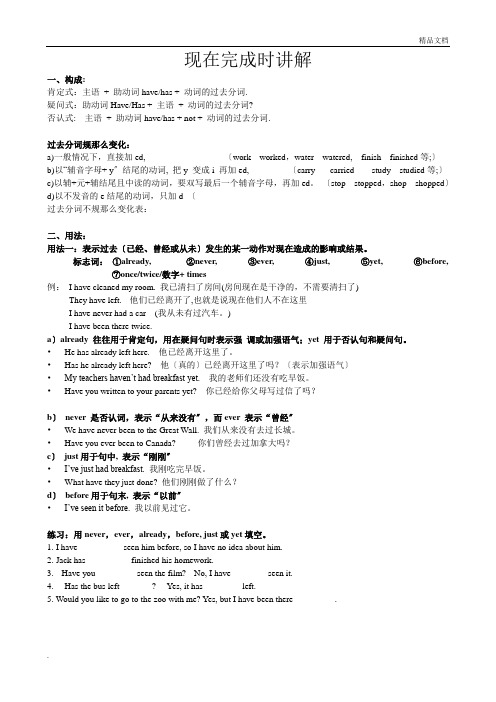
现在完成时讲解一、构成:肯定式:主语+ 助动词have/has + 动词的过去分词.疑问式:助动词Have/Has + 主语+ 动词的过去分词?否认式: 主语+ 助动词have/has + not + 动词的过去分词.过去分词规那么变化:a)一般情况下,直接加ed, 〔work---worked,water---watered, finish---finished等;〕b)以“辅音字母+ y〞结尾的动词, 把y 变成i 再加ed, 〔carry-- -carried study---studied等;〕c)以辅+元+辅结尾且中读的动词,要双写最后一个辅音字母,再加ed。
〔stop---stopped,shop---shopped〕d)以不发音的e结尾的动词,只加d 〔过去分词不规那么变化表:二、用法:用法一:表示过去〔已经、曾经或从未〕发生的某一动作对现在造成的影响或结果。
标志词:①already, ②never, ③ever, ④just, ⑤yet, ⑥before,⑦once/twice/数字+ times例:I have cleaned my room. 我已清扫了房间(房间现在是干净的,不需要清扫了)They have left. --他们已经离开了,也就是说现在他们人不在这里I have never had a car (我从未有过汽车。
)I have been there twice.a〕already 往往用于肯定句,用在疑问句时表示强调或加强语气;yet 用于否认句和疑问句。
•He has already left here. 他已经离开这里了。
•Has he already left here? 他〔真的〕已经离开这里了吗?〔表示加强语气〕•My teachers haven’t had breakfast yet. 我的老师们还没有吃早饭。
•Have you written to your parents yet? 你已经给你父母写过信了吗?b〕never 是否认词,表示“从来没有〞,而ever 表示“曾经〞•We have never been to the Great Wall. 我们从来没有去过长城。
现在完成时及现在完成进行时讲解及练习

现在完成时讲解一、现在完成时的定义1、表示过去发生或已经完成的动作对现在造成的影响或结果,或从过去已经开始,持续到现在的动作或状态。
2、常用时间状语:recent ly, lately, since+时间点,for+数字+时间名词, in the past fewmonths/years等3、句子结构:肯定形式:have/has + done否定形式:have/has + not +done一般疑问句:have或h as放于句首肯定回答:Yes, 主语+have/has.否定回答:No, 主语+have’t/has’t.二.现在完成时的用法:其用法主要有三种I.“已完成”用法 :表示一个过去发生并结束的动作对现在造成的影响或结果。
这一类情况可以细致分为下述两种情况。
1)表示开始于过去的动作刚刚结束。
常和just,now,alread y,yet,not…yet等不确定的时间状语连用。
Li Ming has just turned off the light.李明刚刚把灯关上。
(说明现在灯关上了)I've finish ed my homewo rk now. 现在我已经做完作业了。
(说明可以交作业或做别的了)2)表示过去动作的结果,现在仍残留着。
一般不用时间状语。
I have lost my pen. 我把笔丢了。
(说明过去某时丢的,现在我还没找到这支笔)She has become a teache r. 她已经当了老师。
(说明她现在仍是老师)II.“未完成”用法。
表示动作或状态从过去某时开始,持续到现在,可能继续下去,也可能刚刚结束。
常和表示一段时间的状语连用。
如today,this week(month),lately,recent ly,thesedays,in the past few days,during the last two weeks,since,sinceyester day,since2 days ago,since1991,for a long time,for a month,so far,up to now,till(until)now等。
现在完成时及现在完成进行时讲解及练习知识讲解

现在完成时及现在完成进行时讲解及练习现在完成时和现在完成进行时一.现在完成时的构成:助动词 have(has)+动词的过去分词构成。
has用于第三人称单数,have用于其他各种人称.二.现在完成时的用法:其用法主要有三种I.“已完成”用法 :表示一个过去发生并结束的动作对现在造成的影响或结果。
这一类情况可以细致分为下述两种情况。
1)表示开始于过去的动作刚刚结束。
常和just,just now连用。
Li Ming has just turned off the light. 李明刚刚把灯关上。
I've finished my homework just now. 我刚刚做完作业了。
2)表示过去动作的结果,现在仍残留着。
I have lost my pen. 我把笔丢了。
(说明过去某时丢的,现在我还没找到这支笔)She has become a teacher. 她已经当了老师。
(说明她现在仍是老师)II.“未完成”用法。
表示动作或状态从过去某时开始,持续到现在,可能继续下去,也可能刚刚结束。
常和段时间连用。
如lately,recently,these days,in the past few days,during the last two weeks,since,for +段时间,so far,up to now,till(until) now等。
He has lived here for 30 years. 他住在这儿三十年了。
(现在还住在这儿)They've known each other since childhood. 他们从小彼此相识。
(现在还在往来)How long have you studied English?你学英语多久了?(现在仍在学)III. 经验性用法:表示从过去开始到目前为止这段时间中反复发生的动作或多次出现的状态。
常与频度副词如,never,ever, already, yet,often,always,every week,twice等连用。
英语现在完成时专项讲解及练习

现在完成时专项(一)现在完成时:一.现在完成时的用法(1)表示过去发生或已经完成的动作对现在造成的影响或结果。
常和just(刚刚),already(已经) ,yet(已经) ,never(从不),ever(曾经),before(以前),so far(到目前为止)等时间状语连用。
- Have you had breakfast yet?你吃过早饭了吗?一Yes,I have. I've just had it.是的,我吃过了。
我刚吃过。
(现在我不饿了)I've already read the book.我已经读过这本书了。
(了解了书的内容)(2)表示从过去某一时刻开始一直持续到现在的动作或状态,还有可能继续下去,常和for或since引导的时间状语连用。
此时的谓语动词必须是延续性动词。
They have lived here for twenty years.他们在这里住了20年了。
(还可能继续住下去)We' ve lived here since 2006.从2006年开始我们便住在这里。
二、构成“助动词have (has)+动词过去分词”构成现在完成时。
主语为第三人称单数时用has,其余人称用have。
三、句型结构如:He has taken down the wall.他已经把那面墙拆了。
He hasn't taken down the wall.他还没拆除那面墙。
-Has he taken down the wall?他拆除那面墙了吗?-Yes, he has./No, he hasn't.是的,他拆了。
/不,他没拆。
What has the boy given to his friend?男孩给了他朋友什么?Who has finished homework?谁完成作业了?四、动词过去分词的变化规则规则动词的过去分词的构成与过去式的构成相同。
不规则动词的过去分词须特殊记忆。
8B 现在完成时 语法讲解及练习
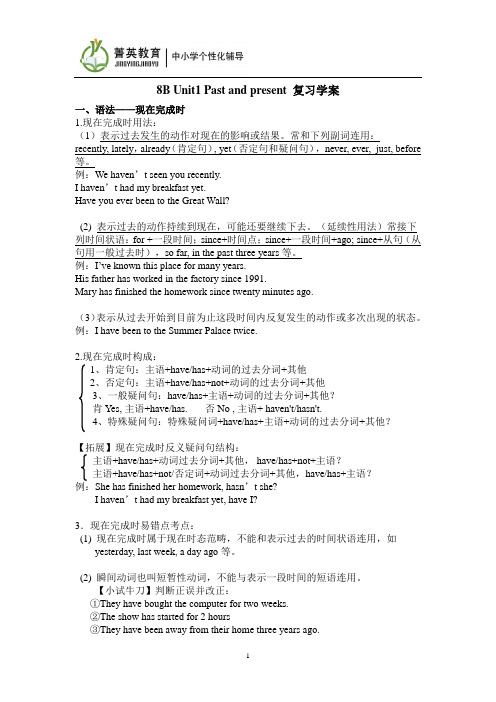
8B Unit1 Past and present 复习学案一、语法——现在完成时1.现在完成时用法:(1)表示过去发生的动作对现在的影响或结果。
常和下列副词连用:recently, lately,already(肯定句), yet(否定句和疑问句), never, ever, just, before 等。
例:We haven’t seen you recently.I haven’t had my breakfast yet.Have you ever been to the Great Wall?(2) 表示过去的动作持续到现在,可能还要继续下去。
(延续性用法)常接下列时间状语:for +一段时间;since+时间点;since+一段时间+ago; since+从句(从句用一般过去时),so far, in the past three years等。
例:I’ve known this place for many years.His father has worked in the factory since 1991.Mary has finished the homework since twenty minutes ago.(3)表示从过去开始到目前为止这段时间内反复发生的动作或多次出现的状态。
例:I have been to the Summer Palace twice.2.现在完成时构成:1、肯定句:主语+have/has+动词的过去分词+其他2、否定句:主语+have/has+not+动词的过去分词+其他3、一般疑问句:have/has+主语+动词的过去分词+其他?肯Yes, 主语+have/has. 否No , 主语+ haven't/hasn't.4、特殊疑问句:特殊疑问词+have/has+主语+动词的过去分词+其他?【拓展】现在完成时反义疑问句结构:主语+have/has+动词过去分词+其他, have/has+not+主语?主语+have/has+not/否定词+动词过去分词+其他,have/has+主语?例:She has finished her homework, hasn’t she?I haven’t had my breakfast yet, have I?3.现在完成时易错点考点:(1) 现在完成时属于现在时态范畴,不能和表示过去的时间状语连用,如yesterday, last week, a day ago等。
- 1、下载文档前请自行甄别文档内容的完整性,平台不提供额外的编辑、内容补充、找答案等附加服务。
- 2、"仅部分预览"的文档,不可在线预览部分如存在完整性等问题,可反馈申请退款(可完整预览的文档不适用该条件!)。
- 3、如文档侵犯您的权益,请联系客服反馈,我们会尽快为您处理(人工客服工作时间:9:00-18:30)。
一.现在完成时的构成:现在完成时由助动词have(has)+动词的过去分词构成。
has用于第三人称单数,have用于其他各种人称.二.现在完成时的用法:其用法主要有三种I.“已完成”用法 :表示一个过去发生并结束的动作对现在造成的影响或结果。
这一类情况可以细致分为下述两种情况。
1)表示开始于过去的动作刚刚结束。
常和just,now,already,yet,not…yet 等不确定的时间状语连用。
Li Ming has just turned off the light. 李明刚刚把灯关上。
(说明现在灯关上了)I've finished my homework now. 现在我已经做完作业了。
(说明可以交作业或做别的了)2)表示过去动作的结果,现在仍残留着。
一般不用时间状语。
I have lost my pen. 我把笔丢了。
(说明过去某时丢的,现在我还没找到这支笔)She has become a teacher. 她已经当了老师。
(说明她现在仍是老师)II.“未完成”用法。
表示动作或状态从过去某时开始,持续到现在,可能继续下去,也可能刚刚结束。
常和表示一段时间的状语连用。
如today,this week (month),lately,recently,these days,in the past few days,during the last two weeks,since,since yesterday,since 2 days ago,since 1991,for a long time,for a month,so far,up to now,till(until)now等。
He has lived here for 30 years. 他住在这儿三十年了。
(现在还住在这儿)They've known each other since childhood. 他们从小彼此相识。
(现在还在往来) How long have you studied English?你学英语多久了?(现在仍在学)III.经验性用法:表示从过去开始到目前为止这段时间中反复发生的动作或多次出现的状态。
常与频度副词如often,always,every week,twice等连用。
I have been to the Summer Palace twice. 我曾经去过颐和园两次。
He has always said so.他总是这么说.三.现在完成时的时间状语I现在完成时属于现在时范围,故不能和过去的时间状语连用。
如:yesterday,last Sunday,in1990,three years ago等。
但是,在强调动作产生的后果和影响时,可以和一些表示不确定的时间状语连用。
a.用副词already和yet。
already一般用于肯定句中,yet一般用于否定句和疑问句中。
如:We have already finished our homework.我们已完成作业了。
They haven't finished their homework yet.他们还没有完成作业。
b.用ever和never.多用于否定或疑问句中,表示“曾经”或“从未“等。
如: -Have you ever been to the Great Wall?你曾经去过长城吗?-I have never been to the Great Wall.我从未去过长城。
c.用表示到说话为止的过去时间状语,如just, before, up to now, the past fewyears等。
例如:I have seen her before,but I can not remember where. 我以前见过她,但记不起在哪里见过。
He has been there three times the last few days. 近几天他去过那里三次了。
d.用包括“现在”在内的时间状语,如now,today,this morning(month,year,term)等。
例如:-Have you met him today?-No,I haven't. 今天你见过他吗?我没有。
How many times have you been there this year? 今年你去过那里多少次?II短暂性动词不能和表一段时间的时间状语连用。
如:come, go, arrive, reach, hear, close, leave, begin, start, lose, buy, fall, join, die, get up等。
但如果要保留表一段时间的时间状语,必须将动词改为延续性动词。
现归纳总结一下由非延续性动词到延续性动词的转换如:fall asleep (ill) →be asleep (ill)get to know→ know begin,(start)→ be onopen →be open buy→ haveget up→ be up die→ be deadgo out→ be out come→ be inclose→be closed arrive→be herejoin→be in, be a +名词finish( end )→be overleave, move →be away,borrow →keepgo to school→be a stu dent catch(a cold)→ have(a cold)begin to study→study come back→be backput on→wear 或be on如:He has been a soldier for three years.他参军三年了。
His father has been dead for two years.他父亲去世二年了。
The film has been on for 5 minutes.电影已开始五分钟了。
We have studied English for three years. 我们(开始)学英语已三年了。
四.几点注意事项I. have been(to)与have gone( to)的区别:have been(to)表示“去过某地(现在已经回来了)”,可用于各人称;have gone(to)表示“去某地了(说话时某人不在当地)”,常用于第三人称,前者可与once ,never,several times等连用,后者则不能。
如: They have been to Beijing twice.他们去过北京两次。
He has gone to Beijing . 他去北京了。
II.不可延续性动词现在完成时的否定式,已变成一种可以延续的状态,因此可以和表示一段时间的状语连用。
如: I haven't left here since 1997.自从1997年以来,我一直没有离开过这儿。
(错)I have received his letter for a month.(对)I haven't received his letter for almost a month.练习一.用since和for填空1.______two years2.____two years ago3.___last month4.______ 19995._______yesterday6._______ 4 o’clock7 4 hours 8._____an hour ago9.___we were children 10._____ lunch time11.____ she left here12. He has lived in Nanjing ___ the year before last.13. I’ve known him ______ we were children.14. Our teacher has studied Japanese ______ three years.15. She has been away from the city ______ about ten years.16. It’s about ten years __________ she left the city.二.单项选择。
1、Both his parents look sad . Maybe they ______what's happened to him .A. knewB. have knownC. must knowD.will know2、He has _______ been to Shanghai , has he ?A. alreadyB.neverC.everD.still3、Have you met Mr Li ______?A. justB. agoC.beforeD. a moment ago4、The famous writer _____ one new book in the past two year .A. is writingB.was writingC.wroteD.has written5、—Our country ______ a lot so far .—Yes . I hope it will be even ______ .A.has changed ; wellB.changed ; goodC.has changed ; betterD.changed ; better6、Zhao Lan ______already ______in this school for two years .A. was ; studyingB. will ; studyC. has ; studiedD. are ; studying7、We ______ Xiao Li since she was a little girl .A. knowB. had knownC. have knownD. knew8、Harry Potter is a very nice film .I______ it twice .A.will seeB.have seenC.sawD.see9、—These farmers have been to the United States .—Really ? When _____ there ?A. will they goB. did they goC. do they goD. have they gone10、—______ you ___ your homework yet ?—Yes . I _____ it a moment ago .A.Did ; do ; finishedB.Have ; done ; finishedC.Have ; done ; have finishedD.will ; do ; finish11、His father ______ the Party since 1978 .A. joinedB. has joinedC. was inD. has been in12、—Do you know him well ?— Sure .We _________ friends since ten years ago .A. wereB. have beenC. have becomeD. have made13、—How long have you ____ here ?—About two months .A. beenB. goneC. comeD. arrived14、Hurry up! The play __________ for ten minutes .A. has begunB. had begunC. has been onD. began15、It _____ ten years since he left the army .A. isB. hasC. willD. was16、Miss Green isn't in the office . she_______ to the library .A.has goneB. wentC.will goD. has been17、My parents ______ Shandong for ten years .A. have been inB. have been toC. have gone toD. have been18.The students have cleaned the classroom, ?A. so theyB. don’t theyC. have theyD. haven’t they19、has Mr White been a member of Greener China since he to China?A. How soon, comesB. How often, gotC. How long, cameD. How far, arrived20.When he arrived at the bus stop, the bus _____ for 20 minutes.A. has leftB. had leftC. has been awayD. had been away21.The factory ____ since the February of 1988.A . has been open B. has opened C. was open D. opened22.Mary and Rose ____friends since they met in 2000.A. have madeB. have beenC. madeD. have become23.You mustn't_____ until he comes back.A. be awayB. leaveC. be left24.The meeting _____ for a week now.A. has finishedB. has endedC. has been over25.Miss Gao ______ this school for nearly 5 years.A. has been inB. has come toC. has taught26.Ben ______ a teacher for 4 years .A. has beenB. has becomeC. wasD. became27. I ______ home for a week.A. have returnedB. have been backC. returned三.用never, ever, already, just, yet, for, since填空1. I have _______ seen him before, so I have no idea about him.2. Jack has _________ finished his homework.3. Mr. Wang has taught in this school ________ ten years.4. “Have you ________ seen the film?” “No, I have ________ seen it.”5. “Has the bus left _______?” “Yes, it has _________ left.”四.用适当的时态填空:1.She’s _____________ (live) here ever since she was ten.2.Both of them ________________ (be) in Hongkong for ten days.3.Both of them ____________ (come) to Hongkong ten days ago.4. Half an hour __________ (pass) since the train __________ (leave).5. Mary________(lose) her pen. ________ you _______(see) it here and there?6. _________ you _____ (find) your watch yet?7. ---Are you thirsty? ---No I _________just _________ (have) some orange.8. We already _________ (return) the book.9. ________ they _______ (build) a new school in the village?10. I _____________(not finish) my homework . Can you help me?11. My father _____ (read) the novel twice.12. I _________ (buy) a book just now.13. I _________ (lost ) my watch yesterday.14. My father ___________ (read) this book since yesterday.五、划线提问1) I have been there for two days.__________ _________ __________ you __________ __________ ?2) My father has lived here since 2000._________ _________ __________ your father _________ __________?3) He left here yesterday._________ ________ he _________ __________?4) They bought a book two hours ago.__________ ___________ they __________ a book六.翻译下列句子:1.你曾经吃过鱼和薯条吗?2. 我刚刚丢了我的化学书。
